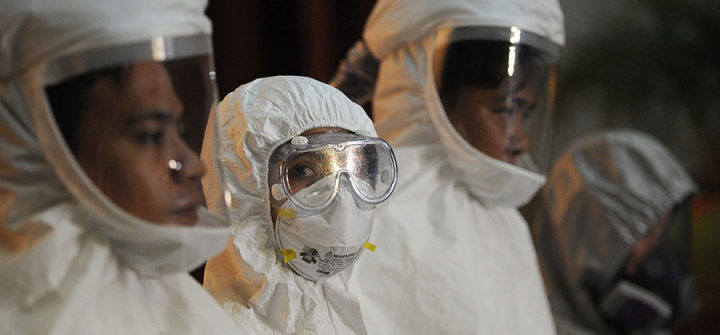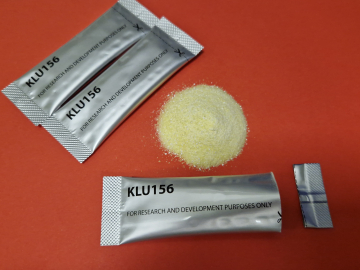No Country is Fully Prepared for High-Consequence Infectious Disease Outbreaks
3 Takeaways:
- Many countries lack essential public health and health system capacities to prevent, detect, and respond to health emergencies, according to the new Global Health Security Index.
- Out of a possible 100 points, the average GHS Index score across 195 countries was 40.2.
- Action is urgently needed to improve countries’ readiness for high-consequence infectious disease outbreaks.
5 years ago last month, the UN Security Council met in crisis over the growing Ebola epidemic in West Africa.
Massive global assistance was needed to stop the outbreak because Guinea, Liberia, and Sierra Leone lacked the capacity to quickly detect and respond to the epidemic. By the time it was over, the epidemic sickened close to 30,000 people, caused upwards of 10,000 deaths, and resulted in $2.8 billion in lost GDP for the 3 affected countries. The enormous tolls of this epidemic demonstrated that when outbreaks occur in countries that are unprepared, they can spill beyond borders, threatening the peace, health and prosperity of others.
Delays in the global response to Ebola in 2014 prompted calls for better understanding and measurement of health security capacity and transparent reporting of countries’ capacities. Health, policy, and security leaders developed high-level reviews and recommended ways to identify, finance, and fill major preparedness gaps within countries. Some of those recommendations have been implemented. For example, the WHO developed an International Health Regulations Joint External Evaluation (JEE) tool to assess countries’ public health capacities related to laboratories, testing, and workforce. This represents an important step toward increased accountability and transparency for national public health capacities. However, many calls-to-action have not been heeded—including, in most countries, those to increase financing and planning to fill urgent health security gaps.
Health security is both a public health and an international security imperative. Significant outbreaks will likely continue to occur. Increases in international travel, mass displacement, migration, climate change, land-use change, and urbanization can enable pathogens to emerge and spread widely, increasing the potential for uncontained outbreaks to become epidemics and pandemics. Countries also face an increased potential threat of accidental or deliberate release of a deadly engineered pathogen, as the same scientific advances that help fight epidemic disease have also allowed pathogens to be engineered or recreated in laboratories. Such global catastrophic biological risks, which can have population-wide impact, are on the rise.
Recognizing this, the Johns Hopkins Center for Health Security and Nuclear Threat Initiative partnered with the Economist Intelligence Unit to create the Global Health Security (GHS) Index, the first comprehensive and transparent benchmarking of 195 countries’ capacities and capabilities to stop outbreaks from becoming international catastrophes. By transparently measuring and publishing country-level results, the GHS Index aims to encourage national and international leaders to take action and assign priority to health security. The index demonstrates for leaders in every country how they measure in terms of the capabilities and enabling factors that are associated with prevention, detection, and response to significant infectious disease outbreaks.
Results from our GHS Index published today demonstrates the stark reality that no country is fully prepared for significant infectious disease outbreaks. Many countries are lacking in essential public health and health system capacities to prevent, detect, and respond to health emergencies. There is even less evidence that countries have demonstrated the ability to exercise these capacities in an actual emergency. The Index also considers countries’ political, socioeconomic, and environmental risks, which can affect their abilities to contain disease outbreaks. The data show significant vulnerabilities in many countries.
How unprepared is the globe as a whole? Out of a possible score of 100 points, we found that the average GHS Index score across 195 countries and combined categories was 40.2. Even countries with more resources are not ready, as the majority of high- and middle-income countries do not score above 50. What these results tell us is that action is urgently needed to improve countries’ readiness for high-consequence infectious disease outbreaks.
This year, we are once again witnessing how infectious disease outbreaks can threaten health, peace, security, and prosperity, as the second deadliest outbreak of Ebola to-date currently spreads within the Democratic Republic of Congo.
Breaking the cycle of panic and neglect that follows health security crises is critical; allowing this cycle to be repeated will require national leaders to commit to investing in and sustaining needed capacities and capabilities. Every country has a responsibility for understanding, tracking, improving, and sustaining national health security. In addition, international organizations also have a role to play, as the level of international need has eclipsed the ability of many individual governments to fill identified gaps. Health security is a collective responsibility—it’s time for all national and global leaders to be accountable for urgent action.
Jennifer Nuzzo, DrPH, SM, is a Senior Scholar at the Johns Hopkins Center for Health Security; and Elizabeth Cameron, PhD, is Vice President of Global Biological Policy and Programs at the Nuclear Threat Initiative.
Join the thousands of subscribers who rely on Global Health NOW summaries and exclusive articles for the latest public health news. Sign up for our free weekday enewsletter, and please share the link with friends and colleagues: https://www.globalhealthnow.org/subscribe
Philippine medical workers donned protective suits during a press conference about Ebola preparedness on October 21, 2014. Image: Ted Aljibe/AFP/Getty




